|
|
|
Sort Order |
|
|
|
Items / Page
|
|
|
|
|
|
|
| Srl | Item |
| 1 |
ID:
110527
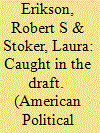

|
|
|
|
|
| Publication |
2011.
|
| Summary/Abstract |
The 1969 Vietnam draft lottery assigned numbers to birth dates in order to determine which young men would be called to fight in Vietnam. We exploit this natural experiment to examine how draft vulnerability influenced political attitudes. Data are from the Political Socialization Panel Study, which surveyed high school seniors from the class of 1965 before and after the national draft lottery was instituted. Males holding low lottery numbers became more antiwar, more liberal, and more Democratic in their voting compared to those whose high numbers protected them from the draft. They were also more likely than those with safe numbers to abandon the party identification that they had held as teenagers. Trace effects are found in reinterviews from the 1990s. Draft number effects exceed those for preadult party identification and are not mediated by military service. The results show how profoundly political attitudes can be transformed when public policies directly affect citizens' lives.
|
|
|
|
|
|
|
|
|
|
|
|
|
|
|
|
| 2 |
ID:
110529
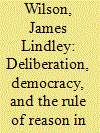

|
|
|
|
|
| Publication |
2011.
|
| Summary/Abstract |
Deliberative democratic theorists argue that important moral questions turn on whether regimes are sufficiently deliberative. To attribute "deliberativeness" to a regime, we need an account of "deliberative integration" that connects such a holistic assessment to the acts or qualities of individuals and smaller groups. I turn to Aristotle's Politics for instruction in developing such accounts, arguing that he judges regimes according to how reliably they act pursuant to excellent common deliberation-a manner of excellent rule that I call the "rule of reason." I then interpret Aristotle's metaphorical argument for the "wisdom of the multitude" to establish the claim that democracies may best integrate citizens' deliberations. This interpretation illuminates Aristotle's complex evaluation of regimes, including his ambivalent views on the rule of the many. It also suggests a structure for contemporary accounts of deliberative integration helpful even for those who differ from Aristotle in their basic moral concerns.
|
|
|
|
|
|
|
|
|
|
|
|
|
|
|
|
| 3 |
ID:
110530
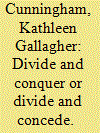

|
|
|
|
|
| Publication |
2011.
|
| Summary/Abstract |
Why do states make concessions to some self-determination movements but not others? This article explores the role of the internal characteristics of these movements, demonstrating that their internal structures play a major role in determining which groups get concessions. Using new data on the structure of self-determination movements and the concessions they receive, I evaluate whether states respond to internally divided movements by trying to "divide and conquer" or "divide and concede." Consistent with the latter approach, I find that internally divided movements receive concessions at a much higher rate than unitary ones and that the more divided the movement is the more likely it is to receive concessions. Yet, concessions to unitary movements appear to work better to settle these disputes. This suggests that states use concessions not only as a tool to resolve disputes, but also as part of the bargaining process.
|
|
|
|
|
|
|
|
|
|
|
|
|
|
|
|
| 4 |
ID:
110537
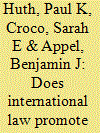

|
|
|
|
|
| Publication |
2011.
|
| Summary/Abstract |
In this article, we explain the role of international law in the resolution of territorial disputes from 1945 to 2000. In doing so, we focus on three outcomes of interest. First, when do states choose to revise the territorial status quo through negotiations instead of force? Second, when are states able to reach a final settlement? Third, when do states prefer a process of legal dispute resolution (i.e., adjudication or arbitration) to bilateral negotiations? To answer these questions, we argue that when the legal principles relevant to the dispute are unambiguous and clearly favor one side, a law-based focal point will emerge. This focal point, in turn, facilitates the settlement process by helping leaders overcome distribution problems, a central obstacle in reaching a final agreement. We find strong and consistent empirical support for our hypotheses regarding international law and peaceful dispute resolution.
|
|
|
|
|
|
|
|
|
|
|
|
|
|
|
|
| 5 |
ID:
110531


|
|
|
|
|
| Publication |
2011.
|
| Summary/Abstract |
Hobbesian war primarily arises not because material resources are scarce; or because humans ruthlessly seek survival before all else; or because we are naturally selfish, competitive, or aggressive brutes. Rather, it arises because we are fragile, fearful, impressionable, and psychologically prickly creatures susceptible to ideological manipulation, whose anger can become irrationally inflamed by even trivial slights to our glory. The primary source of war, according to Hobbes, is disagreement, because we read into it the most inflammatory signs of contempt. Both cause and remedy are therefore primarily ideological: The Leviathan's primary function is to settle the meaning of the most controversial words implicated in social life, minimize public disagreement, neutralize glory, magnify the fear of death, and root out subversive doctrines. Managing interstate conflict, in turn, requires not only coercive power, but also the soft power required to shape characters and defuse the effects of status competition.
|
|
|
|
|
|
|
|
|
|
|
|
|
|
|
|
| 6 |
ID:
110536
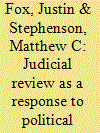

|
|
|
|
|
| Publication |
2011.
|
| Summary/Abstract |
We use an agency model to analyze the impact of judicial review on the incentives of elected leaders to "posture" by enacting bold but ill-advised policies. We find that judicial review may exacerbate posturing by rescuing leaders from the consequences of unwise policies, but may also discourage posturing by alerting voters to unjustified government action. We further find that judges will defer to the decision of elected leaders unless posturing is sufficiently likely. We then show how judicial review affects voter welfare, both through its effect on policy choice and through its effect on the efficacy of the electoral process in selecting leaders. We also analyze how the desirability of judicial review is affected by characteristics of the leaders and the judges.
|
|
|
|
|
|
|
|
|
|
|
|
|
|
|
|
| 7 |
ID:
110528
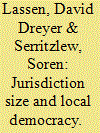

|
|
|
|
|
| Publication |
2011.
|
| Summary/Abstract |
Optimal jurisdiction size is a cornerstone of government design. A strong tradition in political thought argues that democracy thrives in smaller jurisdictions, but existing studies of the effects of jurisdiction size, mostly cross-sectional in nature, yield ambiguous results due to sorting effects and problems of endogeneity. We focus on internal political efficacy, a psychological condition that many see as necessary for high-quality participatory democracy. We identify a quasiexperiment, a large-scale municipal reform in Denmark, which allows us to estimate a causal effect of jurisdiction size on internal political efficacy. The reform, affecting some municipalities, but not all, was implemented by the central government, and resulted in exogenous, and substantial, changes in municipal population size. Based on survey data collected before and after the reform, we find, using various difference-in-difference and matching estimators, that jurisdiction size has a causal and sizeable detrimental effect on citizens' internal political efficacy.
|
|
|
|
|
|
|
|
|
|
|
|
|
|
|
|
| 8 |
ID:
110535


|
|
|
|
|
| Publication |
2011.
|
| Summary/Abstract |
Political justification figures prominently in contemporary political theory, notably in models of deliberative democracy. This article articulates and defends the essential role of partisanship in this process. Four dimensions of justification are examined in detail: the constituency to which political justifications are offered, the circumstances in which they are developed, the ways in which they are made inclusive, and the ways in which they are made persuasive. In each case, the role of partisanship is probed and affirmed. Partisanship, we conclude, is indispensable to the kind of political justification needed to make the exercise of collective authority responsive to normative concerns.
|
|
|
|
|
|
|
|
|
|
|
|
|
|
|
|
| 9 |
ID:
110534
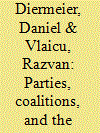

|
|
|
|
|
| Publication |
2011.
|
| Summary/Abstract |
We present a theory of parties-in-legislatures that can generate partisan policy outcomes despite the absence of any party-imposed voting discipline. Legislators choose all procedures and policies through majority-rule bargaining and cannot commit to vote against their preferences on either. Yet, off-median policy bias occurs in equilibrium because a majority of legislators with correlated preferences has policy-driven incentives to adopt partisan agenda-setting rules-as a consequence, bills reach the floor disproportionately from one side of the ideological spectrum. The model recovers, as special cases, the claims of both partisan and nonpartisan theories in the ongoing debate over the nature of party influence in the U.S. Congress. We show that (1) party influence increases in polarization, and (2) the legislative median controls policy making only when there are no bargaining frictions and no polarization. We discuss the implications of our findings for the theoretical and empirical study of legislatures.
|
|
|
|
|
|
|
|
|
|
|
|
|
|
|
|
| 10 |
ID:
110533
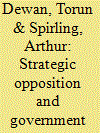

|
|
|
|
|
| Publication |
2011.
|
| Summary/Abstract |
Cohesive government-versus-opposition voting is a robust empirical regularity in Westminster democracies. Using new data from the modern Scottish Parliament, we show that this pattern cannot be explained by similarity of preferences within or between the government and opposition ranks. We look at differences in the way that parties operate in Westminster and Holyrood, and use roll call records to show that the observed behavior is unlikely to be determined by preferences on any underlying issue dimension. Using a simple variant of the agenda-setting model-in which members of parliament can commit to their voting strategies-we show that the procedural rules for reaching collective decisions in Westminster systems can explain this phenomenon: in the equilibrium, on some bills, members of the opposition vote against the government irrespective of the proposal. Such strategic opposition can reinforce government cohesiveness and have a moderating effect on policy outcomes. We introduce new data from the House of Lords, the Welsh Assembly, and the Northern Ireland Assembly to distinguish our claims from competing accounts of the data.
|
|
|
|
|
|
|
|
|
|
|
|
|
|
|
|
| 11 |
ID:
110532


|
|
|
|
|
| Publication |
2011.
|
| Summary/Abstract |
Against the current consensus among comparative political economists, we argue that inequality matters for redistributive politics in advanced capitalist societies, but it is the structure of inequality, not the level of inequality, that matters. Our theory posits that middle-income voters will be inclined to ally with low-income voters and support redistributive policies when the distance between the middle and the poor is small relative to the distance between the middle and the rich. We test this proposition with data from 15 to 18 advanced democracies and find that both redistribution and nonelderly social spending increase as the dispersion of earnings in the upper half of the distribution increases relative to the dispersion of earnings in the lower half of the distribution. In addition, we present survey evidence on preferences for redistribution among middle-income voters that is consistent with our theory and regression results indicating that left parties are more likely to participate in government when the structure of inequality is characterized by skew.
|
|
|
|
|
|
|
|
|
|
|
|
|
|
|
|
|
|
|
|
|